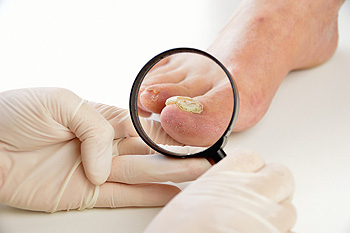6650 Frankford Ave
Philadelphia, PA 19135
 Onychomycosis, also known more commonly as a toenail fungus, is an infection that causes the toenails to become discolored, yellow, thick, and brittle. There are a variety of fungi that cause toenail fungus, and they tend to thrive in dark, warm, and moist environments like sweaty shoes, showers, pools and locker rooms. Poor foot hygiene, wearing nail polish, having a chronic disease such as diabetes, and frequently using community showers or pools are all contributing factors to developing toenail fungus. Because of this, wearing footwear in these areas, along with not sharing shoes or socks, is key to preventing toenail fungus from spreading. Fungal nail infections rarely heal on their own, which means that patients who have an infected nail may wish to consult with a podiatrist. A podiatrist may choose to remove part of the infected nail, prescribe a topical antifungal medication, or prescribe an oral antifungal medication.
Onychomycosis, also known more commonly as a toenail fungus, is an infection that causes the toenails to become discolored, yellow, thick, and brittle. There are a variety of fungi that cause toenail fungus, and they tend to thrive in dark, warm, and moist environments like sweaty shoes, showers, pools and locker rooms. Poor foot hygiene, wearing nail polish, having a chronic disease such as diabetes, and frequently using community showers or pools are all contributing factors to developing toenail fungus. Because of this, wearing footwear in these areas, along with not sharing shoes or socks, is key to preventing toenail fungus from spreading. Fungal nail infections rarely heal on their own, which means that patients who have an infected nail may wish to consult with a podiatrist. A podiatrist may choose to remove part of the infected nail, prescribe a topical antifungal medication, or prescribe an oral antifungal medication.
If left untreated, toenail fungus may spread to other toenails, skin, or even fingernails. If you suspect you have toenail fungus it is important to seek treatment right away. For more information about treatment, contact John M. Fanelly, DPM of Northeast Philadelphia. Our doctor can provide the care you need to keep you pain-free and on your feet.
Symptoms
Treatment
If self-care strategies and over-the-counter medications does not help your fungus, your podiatrist may give you a prescription drug instead. Even if you find relief from your toenail fungus symptoms, you may experience a repeat infection in the future.
Prevention
In order to prevent getting toenail fungus in the future, you should always make sure to wash your feet with soap and water. After washing, it is important to dry your feet thoroughly especially in between the toes. When trimming your toenails, be sure to trim straight across instead of in a rounded shape. It is crucial not to cover up discolored nails with nail polish because that will prevent your nail from being able to “breathe”.
In some cases, surgical procedure may be needed to remove the toenail fungus. Consult with your podiatrist about the best treatment options for your case of toenail fungus.
If you have any questions, please feel free to contact our office located in Philadelphia, PA . We offer the newest diagnostic and treatment technologies for all your foot care needs.